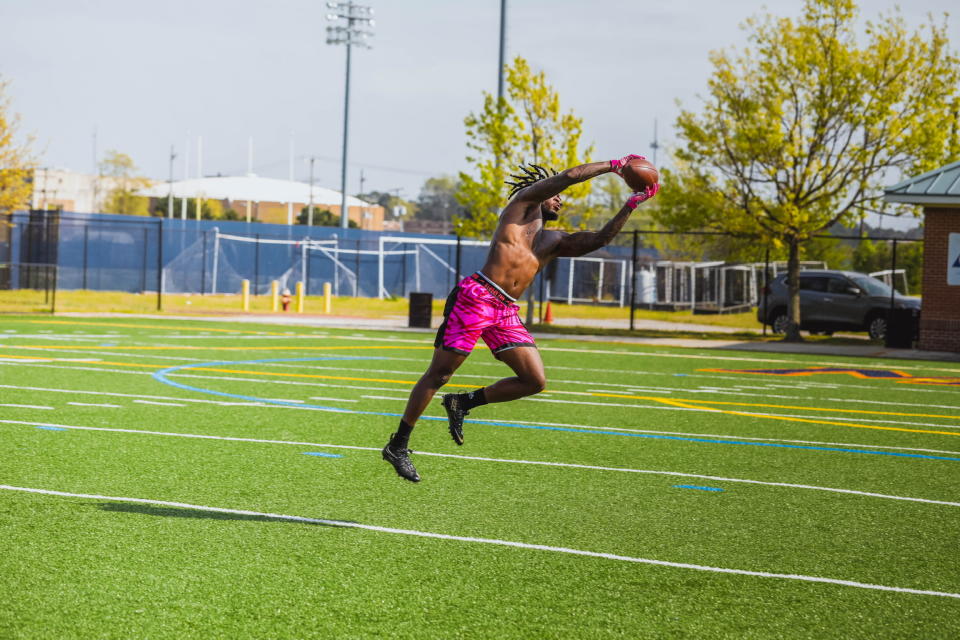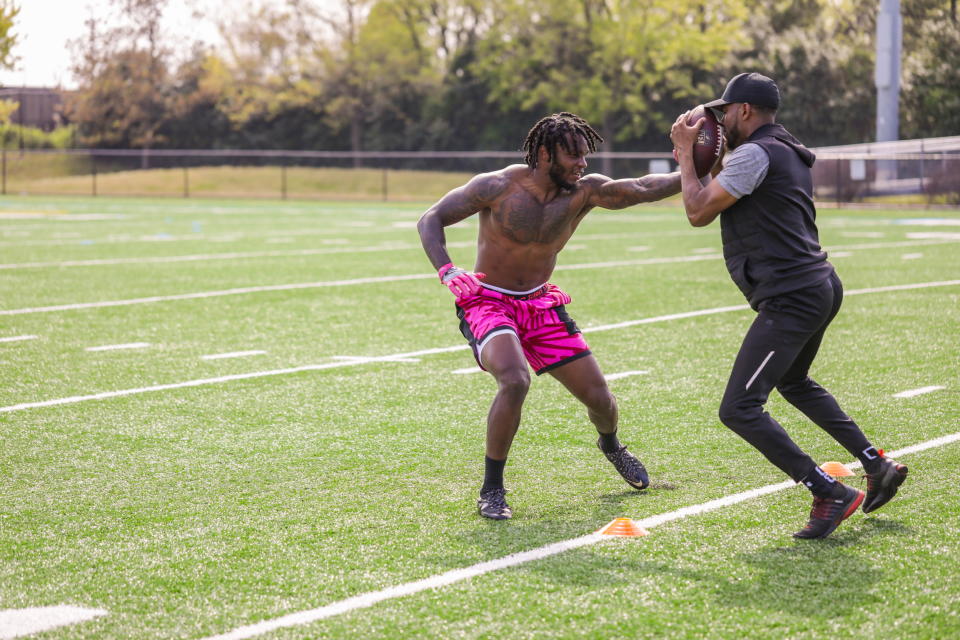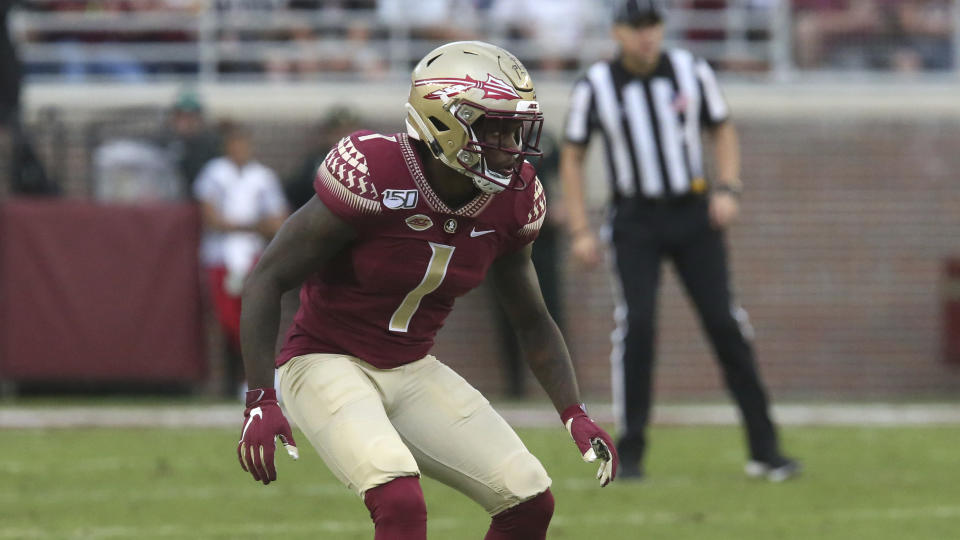Levonta Taylor's pro day got shut down, so he made his own ... that cops almost shut down
Halfway through his best remaining chance to prove that he belongs in the NFL, Florida State defensive back Levonta Taylor struggled to maintain his concentration.
A police officer in a patrol car slowly circled the football field where Taylor’s longtime trainer was putting him through drills. Only minutes later, the officer parked next to the field and two more police cars pulled up alongside him.
“My heart was in my stomach,” Taylor told Yahoo Sports. “I thought they were going to shut us down any minute.”
Snubbed by the Senior Bowl in January and the NFL scouting combine in February, Taylor initially pointed toward Florida State’s March 23 pro day as his lone opportunity to work out in front of representatives from all 32 of the league’s teams. That showcase was only 10 days away when the spread of the coronavirus forced colleges across America to cancel their pro days and the NFL to ground all scouts and eliminate further travel.
Unable to meet with NFL teams in person anymore, Taylor had little choice but to get creative. Either the onetime five-star recruit would have to find another way to prove that he had the speed, strength and skills to play slot corner in the NFL, or he would remain at risk of going undrafted in late April.
At the urging of trainer Aaron Johnson, Taylor decided to throw together his own makeshift pro day and hire a camera crew to film him going through NFL combine-esque drills. He would then post the video to social media and ask his agent to carpet bomb every coach, scout or general manager on his email list.
With sports complexes, public schools and universities shutting down across Virginia and the threat of a statewide lockdown looming, Johnson hunted for a site to hold Taylor’s pro day. Only after being turned away by facilities across the state did Johnson on Saturday finally get permission to use a 2,800-seat stadium in Norfolk the following day.
On Sunday afternoon, more than a dozen friends and family of Taylor defied shelter-in-place guidelines to help him produce a video capable of bolstering his NFL draft stock. Everything was going smoothly until a police officer spotted them and called for backup, leaving Taylor panicked that he would again be denied the chance to show NFL teams what he could do.
“I was explaining the next drill to him and I could see his eyes looking over at the police,” Johnson told Yahoo Sports. “I said, ‘No! Stay focused! We’re going to finish this.’”

No Julian Edelman this year
If NFL front offices are struggling to adjust to a major part of the draft cycle being eliminated by the coronavirus, then the loss of pro days and in-person visits is even worse for would-be draft picks whose futures hang in the balance. Projected early round selections will still hear their names called, but prospects on the margins like Taylor now have less of a chance to make a late impression and improve their stock.
In 2019, 33 players who weren't invited to the scouting combine were still drafted. That number may decrease dramatically this year without pro days that serve as an audition for fringe draft hopefuls.
This year, there won’t be another Julian Edelman, who in 2009 proved that he could transition from quarterback to receiver with an eye-opening pro day. Or another Phillip Lindsay, whose 4.39-second 40-yard dash in front of John Elway in 2018 persuaded the Broncos to take a chance on him as an undrafted signee.
Players who weren’t invited to the combine also will suffer from not having been evaluated by NFL team doctors. Whereas those players would typically receive check-ups during their in-person interviews with individual teams, team executives now must assess the reliability of medical information coming from agents or others with a vested interest.
“The No. 1 group of people it's screwing is the non-combine invitees,” agent Ron Slavin told Yahoo Sports’ Eric Edholm on March 20. “I was talking to a general manager today who said they get a group of about 20 off-the-chart testers from pro days who get on their board for the sixth, seventh round. It just isn’t going to happen this year.”
It has to be disappointing to Taylor that he’s part of that group Slavin believes may suffer.
Only four years ago, after all, Taylor was the most heralded cornerback in his high school class.
In 2015, Taylor chose Florida State over Alabama, Ohio State and other national powers. He then validated his recruiting hype with the Seminoles, flashing potential as a true freshman before establishing himself as one of the ACC’s top cover corners as a sophomore.
By the end of that season, NFL scouts viewed Taylor as a potential early round pick despite his 5-foot-9 stature and modest wingspan. What he lacked in size he made up for with quick feet, savvy football IQ, sure-handed tackling and explosive leaping ability.
Everything began to unravel for Taylor as a junior when he endured offseason back pain yet tried to play through it. Seemingly overnight, he went from an athletic marvel who allowed zero touchdowns in 13 starts as a sophomore to someone quarterbacks could pick on because of his diminutive stature and reduced mobility.
“Me being me, I figured it was just something muscular and I tried to play through it,” Taylor said. “I didn’t want to talk to the trainers about it. I didn’t want to miss out on anything.”
A midseason MRI revealed that Taylor had a stress fracture in his lower back, but the junior still kept the injury quiet and played through it. Not until he suffered a hamstring injury against Clemson a couple weeks later was Taylor finally shut down for the rest of the season.
Having healed over the offseason, Taylor began his senior season optimistic that he could regain his previous form. Second-year coach Willie Taggart and his staff had assured him he would play mostly at nickel corner, the position where NFL scouts envisioned him as a pro.
Much to Taylor’s disappointment, he didn’t get the chance to model himself after Tyrann Mathieu and other disruptive, playmaking slot corners. Taylor spent more time 12 to 15 yards deep in the secondary at safety than he did running disguised blitzes, providing run support or playing press man-to-man.
“At first they told me I’d play a Ty Matthieu role, but it wasn’t nothing like that,” Taylor said. “They told me I was going to be a nickel corner but then out of nowhere they switched and put me at safety.”
In mid-November, Florida State fired Taggart after less than two seasons. Of course, that was no help to Taylor, who suddenly had gone from a potential early-round pick to someone who needed to perform well in pre-draft workouts just to be selected at all.

‘Just straight grind and grit’
Taylor’s quest to restore his reputation as an elite corner began in January at a training facility in Calabasas, California. He impressed trainer Travelle Gaines from the get-go with his quiet focus, work ethic and sprinter’s speed.
“Every kid says they run a 4.3, but in my 14 years of training 300-plus kids for the combine, I’ve maybe had 10 who could actually do it,” Gaines said. “So when he said he could do it and backed it up, I’m like, ‘Oh, maybe this kid is special.’”
For Taylor, the goal for his time with Gaines was to add muscle without sacrificing speed. By the time he left California and returned to his native Virginia in mid-March, he could leap 40-plus inches off the ground and squat nearly three times his 190-pound body weight yet he hadn’t lost a step.
Not having the chance to showcase his talents at the combine or at Florida State’s pro day were crushing blows to Taylor’s aspirations of rising up draft boards, but he handled both disappointments with maturity. It helped that he had someone in his life like Johnson who was ready to spring into action in Taylor’s moment of need.
In addition to finding a venue for Taylor’s makeshift pro day, Johnson hired photographers to take pictures and recruited a track coach to serve as a timekeeper. He even persuaded a videographer friend he first met in college to fly from Houston to Virginia in the middle of the worst global pandemic in more than a century.
Sadalia Ellis prayed three times on the way to the airport on Sunday morning, “Lord, just keep me protected as I go on this trip.” Then she put on her gloves and a mask, boarded her pre-dawn flight and gratefully observed that there were about only 10 other people on the plane.
“I’m an athlete, so I definitely understand what this meant to Levonta,” said Ellis, who played basketball and ran track at Liberty University. “I knew that his pro day was really important to him and that he needed to get a good video, so I wanted to be sure to get out there and help.”
It appeared at first like the Norfolk police might halt Taylor’s pro day before he could finish, but the officers eventually had a change of heart. They said that Taylor could continue as long as there were never more than 10 people on the field or 10 people in the stands, a compromise the group quickly accepted.
Finally able to focus on his workout again, Taylor ran as though a burden had been lifted off his shoulders. He blazed a 4.34-second 40-yard dash on his second try, a faster time than all but one defensive back posted at the 2020 combine. Then during a series of drills, he flashed quick feet, recovery speed and explosiveness out of breaks that were his trademarks prior to his injuries.
“He was adamant about showing his ability to move,” Johnson said. “Our goal at his pro day was to show that this guy can move better than his entire class at corner.”
NFL teams are often reticent to put much faith in athlete- or agency-produced pro day videos because they’re easy to doctor, but the drone footage Ellis used should in this case help ease concerns. Executives can see the raw, unedited footage of Taylor’s 40-yard dash and time it themselves if they want.
In the first 48 hours after Taylor posted the video Sunday night and his agent began sending it around the league, the former Florida State defensive back said he heard from the New York Giants, Jacksonville, Green Bay, Philadelphia and a handful of other teams. He’s optimistic the pro day footage will help solidify him as a third-day draft pick as opposed to someone on the fringes.
The morning after Taylor’s pro day, Virginia’s governor announced a statewide lockdown. The police who allowed Taylor to finish his workout on Sunday would have had no choice but to shut it down 24 hours later.
Knowing that only adds to Taylor’s gratitude to the trainers, coaches, friends and family who helped him pull it off.
At one point, it appeared that Taylor’s path to the NFL would be obstacle-free. Now it will be even more gratifying if he gets there after a crippling back injury, an unwanted position switch and a global pandemic.
“This would be even more special because I didn’t have no pro day, no combine, no Senior Bowl, no nothing,” he said. “Just straight grind and grit.”

More from Yahoo Sports:



